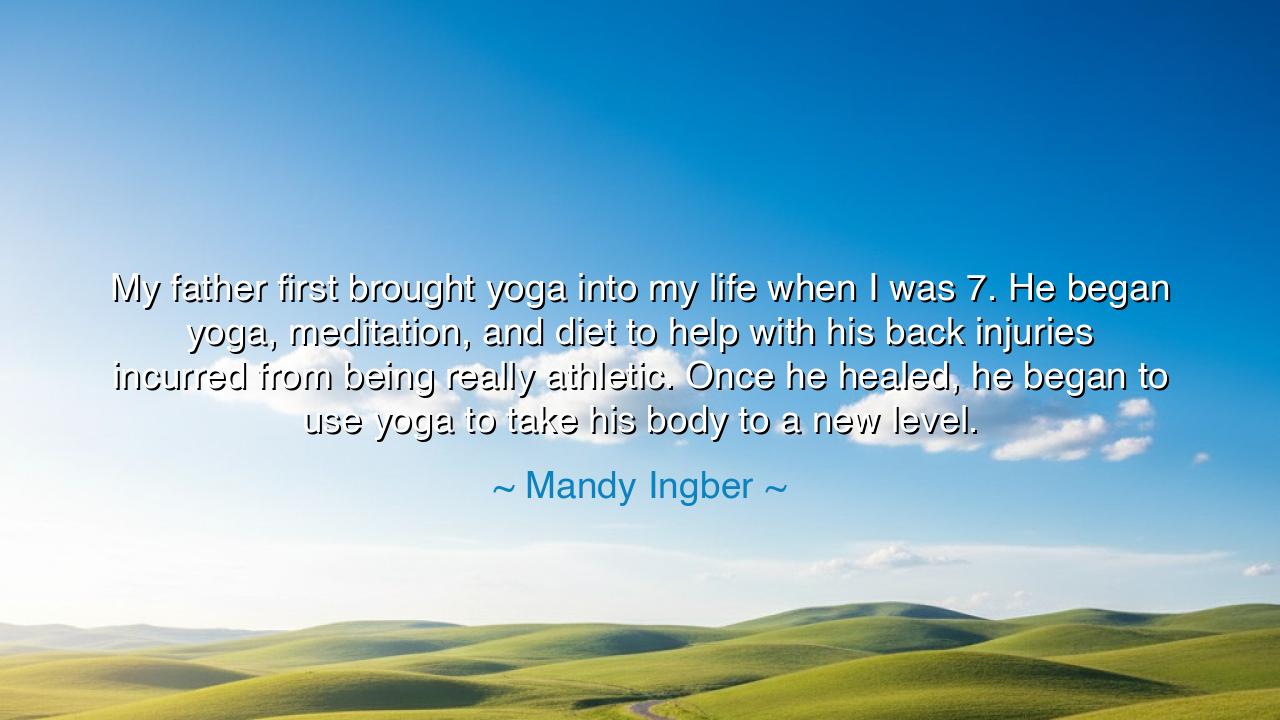
My father first brought yoga into my life when I was 7. He began
My father first brought yoga into my life when I was 7. He began yoga, meditation, and diet to help with his back injuries incurred from being really athletic. Once he healed, he began to use yoga to take his body to a new level.






Listen well, O seekers of wisdom, to the words of Mandy Ingber, who speaks of the ancient practice that shaped her life: "My father first brought yoga into my life when I was 7. He began yoga, meditation, and diet to help with his back injuries incurred from being really athletic. Once he healed, he began to use yoga to take his body to a new level." In these words, we see not only the transformative power of yoga, but also the deep wisdom passed down through generations. Yoga, as we know it today, is not simply a physical practice; it is a spiritual and mental discipline that connects body, mind, and soul. In the ancient world, such practices were seen as the highest form of self-care, a way to heal the body and elevate the spirit.
In ancient times, the great sages and philosophers recognized the interconnectedness of the body and spirit. Hippocrates, the father of medicine, once said, “**Let food be thy medicine, and medicine be thy food.” He understood that health was not just the absence of disease but the presence of balance—balance between the body and mind, between the nourishment of the body and the discipline of the spirit. Mandy Ingber’s story mirrors this ancient wisdom: her father, seeking to heal his body from injury, turned to yoga, not just as a physical practice, but as a way to restore balance and strength. Yoga became for him not just a tool of recovery, but a means of reaching new levels of vitality and power, much like the wise sages of old who sought to elevate both body and mind through rigorous practice.
Consider the ancient yogis of India, whose practice of yoga was not merely a form of exercise but a pathway to transcendence. The great yogi Patanjali, in his Yoga Sutras, taught that true strength comes not just from the body, but from the union of body, mind, and spirit. Through meditation, diet, and physical discipline, the yogis were able to attain inner peace, clarity, and strength. They understood that the body, though it may suffer and age, can be transformed through mindfulness and discipline. Like Mandy Ingber’s father, these ancient sages used yoga not just to heal, but to elevate themselves to a higher state of being. The body is not merely a vessel to be used—it is a temple to be cared for, nurtured, and strengthened.
In the same way, the warriors of ancient Greece, such as the Spartans, understood the importance of both physical strength and mental discipline. Their rigorous training, which included both physical exercise and mental fortitude, shaped them into some of the most feared warriors in history. But the Spartans also understood the need for recovery and healing. They practiced balneotherapy (water therapy), sought out natural remedies, and, like Mandy Ingber’s father, used physical and mental techniques to recover from injuries and maintain their peak performance. They knew that true strength was not just about pushing the body beyond its limits, but about nurturing it with proper care, balance, and rest. Yoga—as a practice of balance—would have resonated deeply with them, for it teaches us to listen to our bodies, to restore them, and to bring them to new heights of vitality.
Mandy Ingber’s father, in seeking to heal from his injuries, embodied this ancient wisdom. His journey from injury to recovery, through yoga, meditation, and a healthy diet, mirrors the holistic approach to health that the ancients embraced. His transformation—moving from merely healing his body to enhancing it—shows us the potential within us all to grow, not just from our wounds, but into something greater. Like the ancient philosophers and healers, his approach was not simply about mending the body, but about transcending it, taking it to a higher level of strength and awareness. In this way, he not only healed but became a living example of the power of balance and discipline.
In our modern lives, we are often taught to see health as something that can be fixed or addressed in isolation: we focus on physical exercise, we take medicine for ailments, or we eat specific foods to enhance our health. But as Mandy Ingber’s story shows, true health is a delicate dance between the body, mind, and spirit. It is through practices like yoga, meditation, and diet that we can reach the balance necessary to not only heal but to thrive. Her father’s journey teaches us that recovery is not a destination, but a process—one that leads us to ever higher levels of vitality and awareness.
So, O future generations, heed this lesson: do not merely seek to heal your body when it suffers. Seek to elevate it, to restore balance and vitality, to nourish both the body and the spirit. Just as yoga was a path to strength and transcendence for the ancient sages, so too can it be for you. Embrace the practices of meditation, mindful movement, and healthy eating to nurture your body and mind, to heal and grow stronger. Yoga is not just for recovery—it is for transformation, for reaching new heights of being. Through this practice, you can move beyond the limitations of the body and into the realms of true vitality, just as the ancient sages and warriors did, and just as Mandy Ingber’s father did. Let his journey remind you that healing is not the end, but the beginning of something greater.






AAdministratorAdministrator
Welcome, honored guests. Please leave a comment, we will respond soon